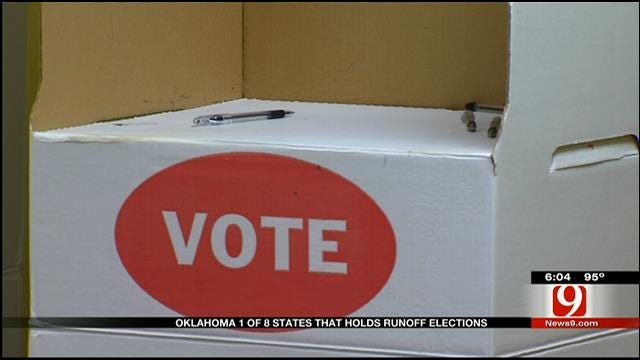Cost Of Oklahoma Runoff Elections Debated
In regards to actually holding runoff elections, you may be surprised to hear, Oklahoma is just one of eight states to hold runoffs. And the negatives of these elections could out-vote the positives.Tuesday, August 26th 2014, 7:20 pm
In regards to actually holding runoff elections, you may be surprised to hear, Oklahoma is just one of eight states to hold runoffs. And the negatives of these elections could out-vote the positives.
For around 80 years, Oklahoma has held runoff elections. But as one political analyst suggests, the state may need to find a new tradition.
"There are a variety of things that happen at the end of summer and beginning of fall. Kids go back to school, Sooners take the field, and we vote our runoffs," said Oklahoma University Political Science Chairman, Dr. Keith Gaddie.
As chairman of the OU political science department, no question Gaddie supports the first two, but questions the third.
"It's almost a non-event," said Gaddie.
The reason for runoff elections is traced back to assuring a candidate gets a true majority of the vote, which is not the case for the most states. But State Election Board Secretary Paul Ziriax also hears the other side of the argument.
"There's a complaint about the cost of conducting a runoff which typically is a lower turn out than a primary," said Ziriax.
On average, voter turnout is nearly 30% lower than in the first primary. And According to the state election board, the cost to hold this runoff election is between $800,000 and a million dollars. The rest of the price tag is picked up by the counties.
Canadian County will pay an estimated $6,000. Cleveland County will pay $11,000 and Oklahoma County will pay over $57,000.
"A runoff is better than not having a runoff," said Gaddie.
So Dr. Gaddie advocates for alternatives:
- Dropping the primary threshold from 50% to 40% majority.
- A jungle primary, where voters decide over the field no matter party affiliation.
- Or his top choice: An instant runoff, which gives voters a first and second preference in the primary, taking out the two month delay.
"You have to reconnect with voters who have been away from politics all summer, that's tough," said Gaddie.
In response to Gaddie's suggestions, the state board said an entirely new system would come with a hefty price tag. Gaddie feels it's a small price to pay for democracy.
Elected officials are in charge of changing election laws and while there was talk of changing runoffs in the state, no legislation was ever created.
More Like This
August 26th, 2014
April 8th, 2025
April 7th, 2025
Top Headlines
April 12th, 2025
April 12th, 2025
April 12th, 2025










